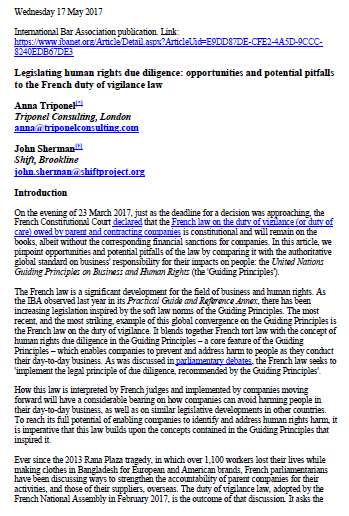By Anna Triponel and John Sherman
Introduction
On the evening of 23 March 2017, just as the deadline for a decision was approaching, the French Constitutional Court declaredthat the French law on the duty of vigilance (or duty of care) owed by parent and contracting companiesis constitutional and will remain on the books, albeit without the corresponding financial sanctions for companies. In this article, we pinpoint opportunities and potential pitfalls of the law by comparing it with the authoritative global standard on business’ responsibility for their impacts on people: the United Nations Guiding Principleson Business and Human Rights (the ‘Guiding Principles’).
The French law is a significant development for the field of business and human rights. As the IBA observed last year in its Practical Guide and Reference Annex, there has been increasing legislation inspired by the soft law norms of the Guiding Principles. The most recent, and the most striking, example of this global convergence on the Guiding Principles is the French law on the duty of vigilance. It blends together French tort law with the concept of human rights due diligence in the Guiding Principles –a core feature of the Guiding Principles –which enables companies to prevent and address harm to people as they conduct their day-to-day business. As was discussed in parliamentary debates, the French law seeks to ‘implement the legal principle of due diligence, recommended by the Guiding Principles’.
How this law is interpreted by French judges and implemented by companies moving forward will have a considerable bearing on how companies can avoid harming people in their day-to-day business, as well as on similar legislative developments in other countries. To reach its full potential of enabling companies to identify and address human rights harm, it is imperative that this law builds upon the concepts contained in the Guiding Principles that inspired it.
Ever since the 2013 Rana Plaza tragedy, in which over 1,100 workers lost their lives while making clothes in Bangladesh for European and American brands, French parliamentarians have been discussing ways to strengthen the accountability of parent companies for their activities, and those of their suppliers, overseas. The duty of vigilance law, adopted by the French National Assembly in February 2017, is the outcome of that discussion. It asks the largest French companies, approximately 150 of them, to develop, publish and effectively implement a ‘vigilance plan’ or ‘duty of care plan’ that includes ‘the reasonable vigilance measures to allow for risk identification and for the prevention of severe violations of human rights and fundamental freedoms’.

